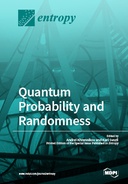Explore

Quantum Probability and Randomness
Andrei Khrennikov and Karl Svozil
2019
0 Ungluers have
Faved this Work
Login to Fave
The last few years have been characterized by a tremendous development of quantum information and probability and their applications, including quantum computing, quantum cryptography, and quantum random generators. In spite of the successful development of quantum technology, its foundational basis is still not concrete and contains a few sandy and shaky slices. Quantum random generators are one of the most promising outputs of the recent quantum information revolution. Therefore, it is very important to reconsider the foundational basis of this project, starting with the notion of irreducible quantum randomness. Quantum probabilities present a powerful tool to model uncertainty. Interpretations of quantum probability and foundational meaning of its basic tools, starting with the Born rule, are among the topics which will be covered by this issue. Recently, quantum probability has started to play an important role in a few areas of research outside quantum physics—in particular, quantum probabilistic treatment of problems of theory of decision making under uncertainty. Such studies are also among the topics of this issue.
This book is included in DOAB.
Why read this book? Have your say.
You must be logged in to comment.
Rights Information
Are you the author or publisher of this work? If so, you can claim it as yours by registering as an Unglue.it rights holder.Downloads
This work has been downloaded 596 times via unglue.it ebook links.
- 67 - pdf (CC BY-NC-ND) at Unglue.it.
- 341 - pdf (CC BY-NC-ND) at res.mdpi.com.
Keywords
- Algebra
- algorithmic complexity
- anisotropic invariants
- bandwagon effect
- Bayesian inference
- Bayes’ formula
- bell inequalities
- bit commitment
- Borel normality
- Bose–Einstein statistics
- causality
- Causation
- complementarity
- contextuality
- Copenhagen interpretation
- correlations
- entanglement
- entanglement classes
- entanglement polytope
- Entropy
- epistemic operations
- Geometry
- Gram–Schmidt process
- Greechie diagrams
- groups
- holistic semantics
- indefiniteness
- indeterminism
- information interpretation of quantum theory
- Irreducible randomness
- Kochen–Specker sets
- master equation for socio-information excitations
- maximization of quantum conditional min-entropy
- MMP hypergraphs
- model selection
- operational approach
- orthogonality
- partially defined algebras
- potentiality
- Probability
- probability representation
- protocol
- quantum computation
- quantum contextuality
- quantum dynamics
- quantum entanglement
- quantum foundations
- quantum information
- quantum information field
- quantum information theory
- quantum logic
- quantum logics
- quantum probability
- quantum random number
- quantum technology
- Quantum-like models
- quantum-like models for social stochasticity
- quasigroups
- qubits
- random number generators
- random numbers
- randomness
- Realism
- Reality
- Reference, information & interdisciplinary subjects
- Research & information: general
- resonator of social laser
- social atom
- social energy
- social laser
- social thermodynamics
- three-qubit random states
- uncertainty relations
- vacuum state
- viable cultures
Links
DOI: 10.3390/books978-3-03897-715-5Editions


